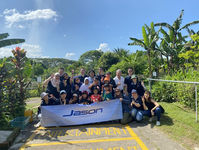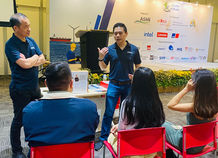
Jason Marine's
Sustainability Program
A testament to our commitment to becoming a preferred corporate citizen within our society.
At Jason Marine, it is our goal to be our society’s preferred corporate citizen. The nature of our operations means that our main contact with the society is with the maritime community at the shipyards and vessels where we operate in, and those who use our systems and products. Through our stringent safety standards and responsible use of products, we ensure that any negative impacts for the maritime community are minimal. We also aim to positively impact local communities beyond the maritime community, and we have been doing so through community development and engagement programmes.
Community Engagement
List of Activities
-
Adopt-a-family Outing 2023
-
SBFF-ITE Mentoring Programme 2022
-
Inaugural Marine & Offshore Youth Forum 2022
-
Edu-Aid 2014 - 2024 for low income families of Telok Blangah
-
Donation to Palm Island Bursary Club to provide sport facilities for NTU
-
Donation to Beyond Social Services to support the disadvantaged children
-
Visit to St. John’s Home
-
Health Talk “The Importance of Regular Eye Check-Ups”
-
Mother’s Day celebration
-
Fund raising for Indonesian colleagues Chen Su Lan Children Home
-
MILK Fund (Mainly I Love Kids) donation
-
Visit to Chen Su Lan's Children Home
-
MoneySmart programme to create awareness of the importance of personal financial management
-
Mother’s Day celebration
-
BigWalk sponsorship for staff and their family
-
Health Talk on Osteoprorosis
-
Ice Cream for Charity Sale
-
Blood Donation
-
The Humanitarian Assistance to The Victims of Tidal Wave
Work-Life Balance
Work-Life Balance is another CSR initiative by Jason Marine managed by its two in-house committees, Recreation Club and Workplace Health Club. The objectives of these committees are to promote work-life balance and healthy lifestyle to our staff. To this end, we have arranged activities such as company dinner & dance, department bonding sessions, health talks, badminton competition, family carnival & zumba lessons. These activities encourage our staff to learn something new, maintain a healthy lifestyle, and bond with their colleagues at the same time. These initiatives have garnered the Singapore Health Award (Gold) in 2013.












BUSINESS EXCELLENCE

ISO 27001
Jason Marine has established and applies an Information Security Management System for the scope of IT Management, Operation and Maintenance supporting the Design, Sales, Project Management, Integration, Installation, Commissioning and Servicing of Navigation, Telecommunication, Instrumentation and Marine Electronic Systems and Products for Marine and Oil and Gas Industries

Integrated ISO 9001 and ISO 45001 Management System
Jason Marine believes and is committed to provide a safe and healthy working environment for employees to work. We believe this will contribute directly to productivity with higher employee satisfaction, minimum days lost due to safety incidents and less absenteeism from poor health. When proper safety procedures are in place, employees can work with full peace of mind more productively. Adhering to rigorous occupational health and safety standards minimises the number of days lost through workplace incidents, allowing customers to enjoy optimal turnaround times.

bizSAFE Star
Jason Electronics is accredited with bizSAFE Star by the Workplace Safety and Health Council of Singapore.

Business Continuity Management
We are among the first few Singapore companies to fulfill the Business Continuity Management (BCM) requirements of TR19:2005. BCM has prepared Jason Electronics against various crisis, and ultimately allows it to safeguard the interests of its key stakeholders at all times.
The Management is committed to establish, maintain and continually improve the Business Continuity Management System (BCMS) to enable Jason Electronics to meet the minimum business continuity objectives and provision of key products and services. The BCM Policy shall be part of the management review to ensure continuing suitability or when there significant changes occur.
Health, Safety and Environment (HSE)
Our management takes ownership to ensure workplace safety and emphasize on continuously improving health and safety at work or on site. We has successfully attained certification to Workplace Safety & Health: bizSAFE STAR, and Occupational Health & Safety Management System: ISO 45001, signifying that the company’s risk management system has effectively established safe work procedures for its operations. Our management considered work safety their top priority and fully committed to the HSE policy. Relevant safety trainings are provided in preparing and supporting our staff in carrying out their tasks and work safely to minimize workplace incidents.


ISO 45001:2018

bizSAFE Level Star
Safety and Health Policy
The management and staff are committed to prevent injury and ill health at the workplace, and comply with applicable legal and other requirements.
Jason Marine Group Limited and its Group of Companies are committed in:
-
Providing safe and healthy working environment for all employees.
-
Continuously improve our quality and OHS management system and performance.
-
Ensure that each employee is adequately trained and familiarized with the relevant statutory requirements, codes of practices and the company’s safety procedures in order to carry out his/her work safely.
-
Each employee is expected to comply with the safety, health and environment standards.
-
Ensure equipment and materials are maintained in safe working condition.
-
Provision of Personal Protective Equipment (PPE) and other apparels to equip the worker in carrying out his/her work safely.
-
Instill and promote safety consciousness in every employee of the company.
-
Taking steps to ensure that safety messages are disseminated to all employees, subcontractors, as well as visitors and vendors at the workplace.
-
Each employee should take personal responsibility to prevent injury to himself as well as to his fellow colleagues.
-
Equipping and empowering our employees with necessary knowledge to help them in better maintaining their personal health and work-life balance.
With the integrated management system of ISO 9001 and ISO 45001, we are continuously improving performance on safety for all interested parties and to deliver consistent quality service to our business partners.





















